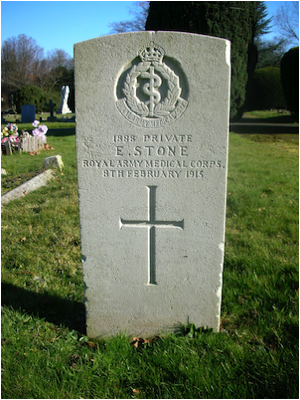Ernest Stone was born in Bristol and having joined the army was billeted in Chelmsford in the initial months of the war. He died at Chelmsford & Essex Hospital in February 1915, one of at least a dozen military victims of an outbreak of meningitis which hit Chelmsford in the early months of 1915.
STONE, ERNEST*,
Private, 3rd South Midland Field Ambulance, Royal Army Medical Corps
Ernest was buried with full military honours in grave 108 at Chelmsford Borough Cemetery in the afternoon of Thursday 11th February 1915. The cortege started from the Hospital, and was watched some hundreds of people who gathered along New London Road. The coffin, which rested on a gun-carriage the 2nd Gloucester. R.F.A., was covered with the Union Jack, upon which were placed the wreaths, and preceding it were the band Royal Berks. playing the Dead March in "Saul," and a firing party with arms reversed from the same regiment. Behind the coffin were the mourners and a detachment of the R.A.M.C., under Capt. Berapath and Lieuts. Smythe and Dacre. The service at the graveside was most impressive, and was conducted the Rev. W. J. Selby, Chaplain tho South Midland Division. At the close three volleys were fired over the grave, the buglers sounded the "Last Post," and the band played a verse of the hymn " When our head are bow'd with woe." Each member the R.A.M.C. detachment saluted the coffin as he left the cemetery. Wreaths were sent by: Mother, brother, and sisters ; A mother; and Lieut.-Col. James Young (3rd South- Midland Field Ambulance).
Ernest's grave already contained the remains of William Tunstall, who had died in 1893, aged 57.
Ernest is commemorated by the 3rd South Midland Field Ambulance's memorial at Bristol Cathedral.
The military victims of the 1915 outbreak of cerebro-spinal meningitis in Chelmsford included:
Harold Leach - 24th January 1915
Charles William Giles - 25th January 1915
Ernest Stone - 8th February 1915
Frederick Sims - 11th February 1915
Bertie Ames - 17th February 1915
William Ernest Bruton - 17th February 1915
Henry Gilbert Edmondson - 19th February 1915
William Andrew - 20th February 1915
Frederick James Andrewartha - 26th February 1916
Thomas Charles Tooth - 4th March 1915
Walter Ernest Harris - 22nd March 1915
Samuel Herbert Bolton - 25th March 1915
140310

Ernest was born in Bristol, Gloucestershire in 1891, one of nine children of James Stone (1837-1913) and Eliza Stone (nee Reynolds) (1848-1915).
In 1901 the census recorded him aged 10 living with his parents in Bristol. He was still with his parents a decade later when the 1911 census listed him as a labourer.
During the First World War Ernest served as Private 1888 in the 3rd South Midland Field Ambulance. In the early months of the war the Ambulance and comrades of the army's South Midland Division were billeted in the Chelmsford area. Ernest's billet was in New Writtle Street, Chelmsford.
There he became unwell and was taken to the Chelmsford & Essex Hospital where, on Monday 8th February 1915 he died from cerebro-spinal meningitis (also known as 'spotted fever'). He was aged 24, but reported locally to be 21.
The week's Chelmsford newspapers reported that his was one of two deaths of soldiers that week from the disease, following recent similar deaths among the civilian and military population in the town.
The week's local newspapers in Chelmsford reported that his was one of two deaths of
soldiers that week from the disease, following recent similar deaths among the civilian and military population in the town. One newspaper stated: "The fever is a dangerous epidemic, and endemic, febrile disease, characterised by inflammation of the membrane of the brain and spinal cord, giving rise to severe headaches tenderness of the back of the neck, paralysis of the muscles, of the eye etc. It is sometimes marked by a skin eruption. There is yet no definite knowledge as to the transmission, but it is not contagious, and it is very rarely indeed that two cases occur in one house. Isolation, however, is considered desirable for nursing and control and we understand that steps are being taken to secure such accommodation should any more cases occur, and that at Chelmsford on 10th February 1915 a conference was held between the Joint Hospital Board and the military authorities on the subject. After a discussion it was decided to hire premises as a temporary arrangement, and pending the provision of a hut at the Isolation Hospital site on the Baddow Road, a mutual agreement being arrived at for a division of the expenses between the civil and the military authorities. It is thus hoped to stamp out the fever."